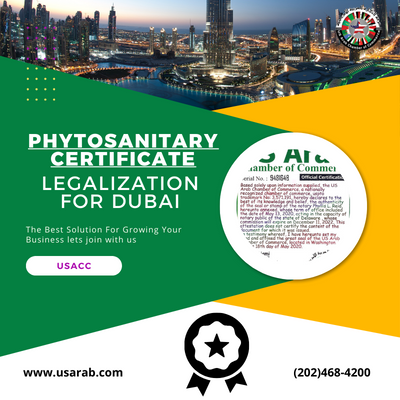UAE Phytosanitary Certificate Legalization Services
For agricultural exporters and businesses dealing with plants, seeds, and plant-based products, the Phytosanitary Certificate is a vital document. It certifies that the agricultural goods meet the plant health standards of the importing country. However, before it is accepted by UAE authorities, it must go through a legalization process to authenticate its validity.
The US Arab Chamber of Commerce is your trusted partner in providing professional, efficient, and reliable legalization services for phytosanitary certificates and other commercial documents intended for use in the UAE.

Expedited Legalization Services
The total cost of the Phytosanitary Certificate legalization varies depending on the requirements of the specific document. Below is a breakdown of our fees:
Service fee: $60
Embassy of UAE fee: $600 (8 business days)
Maryland notary, court and state fees (if required): $15 (1 business day)
U.S. Department of State fee (if required): $20 (9 business days)
U.S. Arab chamber of commerce stamp: $35 (1 business day)
Note: If you don’t require expedited service, you’ll save $20 per document.
You can choose between Original Business Documents or Digital Business Documents.
Service fee: $60
Embassy of UAE fee: $600 (8 business days)
Maryland notary, court and state fees (if required): $15 (1 business day)
U.S. Department of State fee (if required): $20 (9 business days)
U.S. Arab chamber of commerce stamp: $35 (1 business day)
What is a Phytosanitary Certificate?
Legalization services act as a bridge between documents issued in one country and their recognition and acceptance in another. In the context of the UAE, the UAE Phytosanitary Certificate Legalization Services ensure that phytosanitary certificates adhere to the legal and administrative prerequisites required for validation within the UAE jurisdiction. This process is essential in preserving the authority and credibility of these certificates when used in the UAE.
When doing business in the UAE, the UAE Ministry of Climate Change and Environment or relevant authorities require that your phytosanitary certificate be authenticated and legalized to confirm it is genuine and issued by a recognized U.S. authority.
Why Legalization is necessary
Legalization ensures that your Phytosanitary Certificate is officially recognized in the UAE. Without this authentication, your shipment could face serious delays, penalties, or outright rejection by customs. Legalization affirms that the document is not only valid but also trustworthy for use in international trade and compliance processes.
Importance of Legalizing Phytosanitary Certificates for use in the UAE
Mandatory for customs clearance:
Mandatory for customs clearance:
The UAE requires that all agricultural imports be accompanied by a legalized phytosanitary certificate. Without this, your goods may be held at the port or denied entry.
Ensures product credibility:
Legalization enhances the credibility of your business and the authenticity of your plant-based products in international markets, especially when engaging with UAE governmental agencies and private entities.
Prevents delays and financial loss:
A non-legalized or improperly authenticated certificate can lead to clearance delays, storage fees, spoilage of perishable goods, or even shipment rejection, causing financial and reputational damage.
Promotes trade efficiency:
Proper legalization streamlines your export process and fosters trust with UAE importers, helping you establish a smooth and repeatable international trade workflow.
Why trust the US Arab Chamber of Commerce?
We provide end-to-en support for U.S. businesses needing document legalization for the UAE. Our team manages every step of the process, from document review to UAE embassy submission, ensuring full compliance with international standards.
With transparent pricing, responsive customer service, and a deep understanding of UAE legal and regulatory requirements, we help businesses of all sizes efficiently legalize their documents without hassle.
